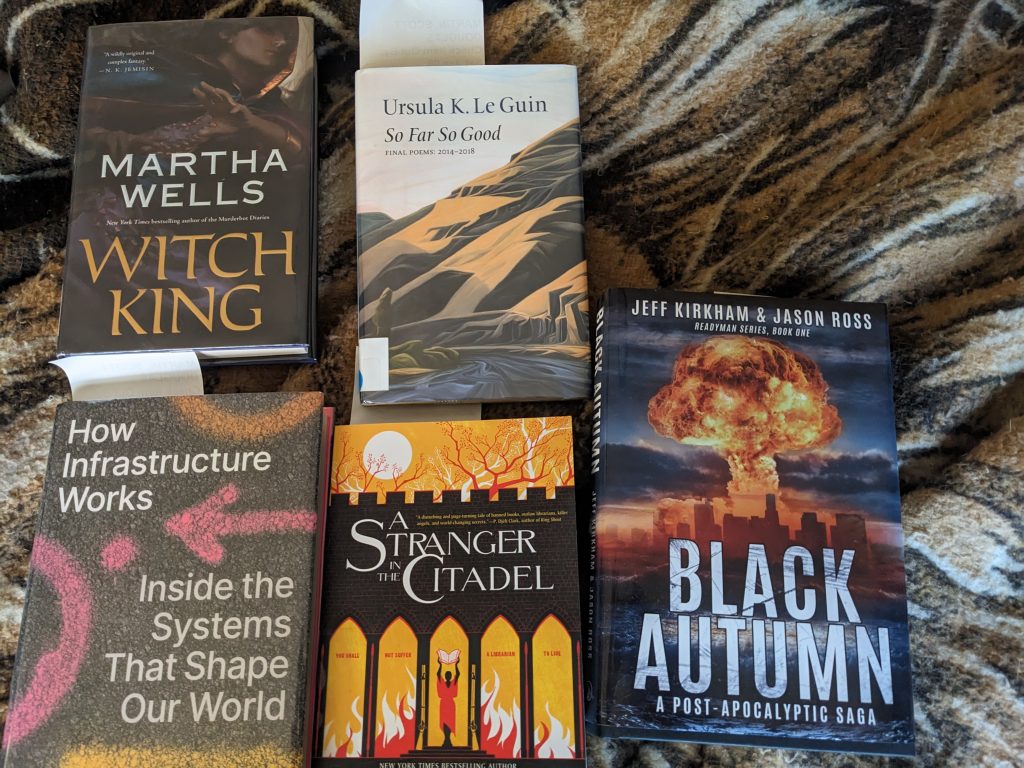December and January

December and January

We’re back with retired Caribbean Intelligence officer Prudence Jones, Roo to his friends.
The book is a fun continuation of Roo’s career–well, post career, as he’s retired from the agency. But his skills, contacts and tradecraft drag him back into the mix. An old friend dies, but an “on death” message directs him to a secret flash drive and a global conspiracy… that’s too well protected to identify after a brief review.
It’s a cool plot with great action scenes and chemistry between the leads. This could easily be a 21st century version of spycraft to rival James Bond for a more complicated world with a more underdog feel.
I’ll keep an eye out for further books in the series.
Sagan Diary by John Scalzi. I liked the idea of this, but didn’t enjoy the novella much separated from the remainder of the series. It’s an interesting experiment, and it’s so positive in outlook that it stands apart. Writing positively about love seems much tougher than hate, vengeance, and action-y revenge. So for a story on the skew, it’s well done. I want to read it alongside a reread of the series–I bet it works better when the characters are fresh in our minds.
The Mirror Empire by Kameron Hurley. This is as large and bold as everyone’s been saying. It’s fantasy world building that explicitly turns away from medieval European influences, and it’s vibrant for it.
There are a lot of protagonists; sometimes the queue for transitioning to a new character left me a little confused, getting up to speed over the first page of the chapter. That’s probably due to the sprawling cast and many POV characters.
I’m very much looking forward to rereading this. I suspect that having paid the price to adjust to the world (and fight off my default assumptions), the next read will allow me to focus more on the characters, their story arcs and adventures.
Randall Munroe’s What If is culled from his excellent What If? website. I really like the way that he approaches the questions, and there’s enough science transmitted to me that it checks some of my gut-feeling level assumption. (The rocket fuel/exhaust velocity relationship from the golfing to propel a ship question really illustrated something I’d never thought much about.)
Tobias Buckell’s Arctic Rising is a great near future adventure. It’s a bit fish-out-of-water, in that Anika is a pilot, but her challenges are up close and personal. It builds into a mystery that coheres (until it reaches peak Bond Villain, where it’s suddenly quite fantastic). The world building in the background feels all too realistic–particularly the competing powers in the arctic waters, the need of the navies to justify themselves, and so on.
All in all, it was well written and interesting. I’ll be checking out the sequel, Hurricane Fever, soon.
Best Served Cold by Joe Abercombie. This is a great low-fantasy world, very divided–much like Renaissance Italy, with neighboring powers influencing the local situation, shifting alliances, and mercenary bands.
Monza’s a driven anti-hero, well drawn, engaging, and I could identify with her despite her villainy and willingness to embrace horrific practices in her revenge. The book balances a number of things; Monza’s gather allies are each unique and have a healthy regard for themselves.
One of the great, very subtle things that emerges as the story advances is that Benna gains real heft. We see Monza encounter person after person who challenges her “avenging my innocent brother” story, and we see her flashback to the past with a new read, changing how we see both Monza and her brother.
I just finished Sandman Slim by Richard Kadrey. I wasn’t a huge fan, mostly for subject and attitude, but did appreciate the pacing and world building. Ironically, as I sat down to write this below Best Served Cold, I realized how similar the plots are. (In each, the protagonist swears to kill their betrayers one-by-one.)
Stark didn’t click for me as well; I suspect looking deeper would be valuable. Quickly thinking about it: Monza begins hale, is broken, and we endure her painful recovery. Stark is better than ever, cocky and confident.
Stark is also consciously posing, almost from the first moment he steps on stage. As the book progresses, we figure out that his pose conceals pain, but it’s a heavy load of snark before it starts coming through. While there’s more to it, that’s what quickly comes to mind. (Though: his magic making things “too easy” might play into the same difference in feel between the Sandman versus Monza.)
Long story short: it was well written and kept me engaged. I read it quickly and mostly enjoyed it. But I’m not going to hunt for its sequels.